Viewing: Blog Posts Tagged with: scbwi conferences, Most Recent at Top [Help]
Results 1 - 25 of 34
Blog: Adventures in YA Publishing (Login to Add to MyJacketFlap)
JacketFlap tags: Young Adult, Middle Grade, Revision, Novels, Writing for Children, SCBWI Conferences, Sue Corbett, Add a tag
Blog: Adventures in YA Publishing (Login to Add to MyJacketFlap)
JacketFlap tags: SCBWI Conferences, Canada West, Ronda Payne, Add a tag
Blog: Read, Write, Repeat. (Login to Add to MyJacketFlap)
JacketFlap tags: SCBWI, Writing, SCBWI Conferences, Add a tag
Every fall, the Wisconsin Chapter of the Society of Children’s Book Writers and Illustrators gets together to listen, learn and laugh. And the line-up at this year’s conference was one of the best yet.
Authors, editors, an art director and an agent spoke about all facets of childrens books from writing and revising to publishing and marketing.
 Here’s a quick glimpse at some of the memorable quotes the past few days.
Here’s a quick glimpse at some of the memorable quotes the past few days.
Bruce Hale, author of the Chet Gecko mysteries, on SUSPENSE:
- Anxiety is the engine that drives your book. If you can get your reader to ask the big question, ‘What happens next?’ you’ve got them hooked.
- When your character has a secret, it’s like trying to keep a beach ball underwater. There’s energy that wants to come out.
- You don’t want to reveal everything at once. There’s a reason a stripper starts out wearing all his or her clothes.
Learn more about Bruce and his books at his website.
Loraine Joyner, art director at Peachtree, on PICTURE BOOK ART:
- No one wants to flip through a picture book and see just one point of view. You want your pictures to be up and over and in and out and around and under. They should be graceful, like choreography.
- Good artists add their own unwritten story line for the children to notice the third or fourth time they’re listening to the book. Everything doesn’t have to be told in words.
Lisa Yoskowitz, an assistant editor at Dutton Children’s Books, on VOICE:
- Ask yourself, is my voice age-appropriate for kids? Is it well-drawn and multidimensional? Is it original?
- Make the voice of your book shine through in your cover letter. If your book is a rollicking adventure story, don’t write a somber, solemn query letter.
 Deborah Wiles — author of Love, Ruby Lavender, Freedom Summer, Each Little Bird That Sings, Countdown, and more — on WRITING FROM THE HEART.
Deborah Wiles — author of Love, Ruby Lavender, Freedom Summer, Each Little Bird That Sings, Countdown, and more — on WRITING FROM THE HEART.
- You can take your life and turn it into stories by asking, “What do I know?” What do I feel?” “What can I imagine?” We’re always telling our stories the best we can.
- I wrote about everything I loved and was frightened of when I was 10. You have to be brave enough to go there. It’s where stories come from.
- No one can tell your stories but you. It is your obligation to tell your stories.
Learn more about Deborah’s life-based fiction at her website.
Greg Ferguson, an editor at Egmont USA, on SIMPLICITY
Add a CommentBlog: Adventures in YA Publishing (Login to Add to MyJacketFlap)
JacketFlap tags: SCBWI Conferences, Craft of Writing, Claudia Gabel, Pitch, To Market, Ara Burklund, Add a tag
The talented Ara Burklund has been kind enough to share her notes from another SCBWI-LA intensive. Read on for a wealth of information, but as always, if you have an opportunity to hear Claudia Gabel in person, don't miss it!
At the SCBWI's 39th Annual Summer Conference in Los Angeles, Claudia Gabel, Senior Editor at Katherine Tegen Books (an imprint of HarperCollins Children's Books), gave an informative presentation on thinking like a book packager. Book packagers are companies that try to capitalize on trends by developing ideas for manuscripts, hiring writers to produce those manuscripts, and then selling the finished books to large publishing houses.
During her tenure at Alloy Entertainment, the media giant responsible for such pop culture phenomena as GOSSIP GIRL, THE CLIQUE, and THE SISTERHOOD OF THE TRAVELING PANTS, Claudia learned how to spearhead a creative development team. With the skills she brings to her new job, in addition to editing single titles at Katherine Tegen Books, Claudia will be responsible for developing intellectual properties based at HarperCollins. Writers seeking for-hire assignments are invited to contact her through their agents.
So what do packagers look for in an idea? First and foremost is a good CONCEPT. To elaborate, Gabel said Alloy wanted every book they produced to be "aspirational," meaning that upon reading, readers would aspire to be either the characters themselves or their friends. Good concepts are things that everyone can relate to on some level.
Second comes the WOW! factor, which amounts to a great hook.
Third is the PITCH. Knowing a story's pitch (a one-line description) is an effective way to keep the main concept in mind when writing and revising. To develop your one-sentence pitch, here's a formula:
For example, FREAKY FRIDAY is the comedic, middle grade story of a willful, disorganized girl whose life is changed when she wakes up in the body of her mother.
Fourth in the development process is POSITIONING. This is finding competing titles, since their audience will be the same people who will want to read your story. Although admittedly a bit premature, also try visualizing your book's packaging (cover, title page, end pages, etc.). This will give you an idea of how to better sell your book.
Fifth comes establishing the story's SETTING. Setting is basically the first thing the reader will come into contact with. In many stories, it amounts to a character (think New York in SEX AND THE CITY). This stage is even more crucial if you're writing fantasy, where you'll be doing a lot of world building, since the rules of the world you create can play a huge role in the book.
Sixth, think about CHARACTERS. Build a resume for each major character in your story. Strive for concreteness. Character behavior should be consistent but reveal some new aspect of the character's personality as the story progresses. Be sure to establish motivation, since characters must have logical reasons for their actions and the appropriate ability to act. Also, remember to make sure characters change over the course of the story, since as they confront problems, they'll learn to adapt.
Seventh, decide on POINT OF VIEW. Which character will be tel Add a Comment
Blog: Adventures in YA Publishing (Login to Add to MyJacketFlap)
JacketFlap tags: Characterization, SCBWI Conferences, Craft of Writing, Canada West, Add a tag
It's our pleasure to introduce our first ever conference post from outside of the United States! The SCBWI Western Canada Chapter is currently hosting a series of workshops entitled Developing Your Craft. One recent workshop focused solely on character development, and featured Publisher Crystal Stranaghan, of Gumboot Books. Please welcome Ronda Payne, who kindly offered to tell us all about this terrific event. If you have recently attended, or plan on attending an SCBWI event and would like to share your take-aways, please let us know.
Crystal started by asking us to think about books with characters that lingered. What a great exercise! Take a few minutes now and think about it – what book had a character that stuck with you? Our answers ranged from Anne of Green Gables to Jane Eyre and more current fictional people like the main character in “The Sweetness at the Bottom of the Pie” by Alan Bradley. See Bradley’s website at http://www.flaviadeluce.com/.
Once our group of six had planted the focus of great characters in our heads, the learning began. As Crystal explained, details of a character include:
- Physical appearance
- Environmental factors (geography, household structure, etc)
- Core beliefs and values
- Choice and actions under stress (who are they really when there’s no time to think – only respond)
From these points, we explored a number of exercises that helped us to create strong, believable characters. Here are some of the tips I took away:
- You MUST interview your character. Write out question Add a Comment
Blog: Adventures in YA Publishing (Login to Add to MyJacketFlap)
JacketFlap tags: Elana Roth, High Concept, Agents, SCBWI Conferences, Add a tag
In this special installment of Conference Round-Up, we'll head back to the event the Maryland/Deleware/West Virginia Chapter of SCBWI held recently. The Leaps of Imagination: Fact, Fiction, & Fantasy conference was filled with useful information. Many big names were in attendance, such as agent Stephen Fraser, Michelle Poploff (Executive Editor at Delacorte Press Books for Young Readers), agent Elana Roth, Louise May (Vice President/Editorial Director of Lee & Low), and Debra Hess senior Editor at Highlights for Children). Several other industry professionals, as well as authors and illustrators were on hand for the 2-day event. Read on, as Marissa shares tips and information coming out of this conference.
Elana's presentation sought to demistify the term "high concept," which seems to be everywhere these days. Not only was her talk structured and clear, it provided many examples that helped clarify how a book may find itself with this label.
Blog: Adventures in YA Publishing (Login to Add to MyJacketFlap)
JacketFlap tags: Viking Children's Books, Kendra Levin, Genetta Adair, Editors, Revision, Writing for Children, SCBWI Conferences, Add a tag
The Midsouth Region of the Society of Children’s Book Writers and Illustrators presented their Midsouth Writing Retreat this past weekend near relaxing, rural Louisville, Kentucky. The focus of the retreat was to write, and to write a lot. At a charming chapel built in 1879 and later converted to a cozy retreat center, the retreat goers took advantage of four specific blocks of time built into the schedule for their personal writing. While writing was the goal, the whole shebang centered around Kendra Levin, the conduit toward that goal. Kendra is an associate editor with Viking who edits everything from picture books to young adult novels.
“I’ve discovered that if a story has a problem that nine times out of ten it has to do with character motivation Add a Comment
Blog: Adventures in YA Publishing (Login to Add to MyJacketFlap)
JacketFlap tags: Getting Published, Query Letters, Editors, Book Deals, Manuscripts, Agents, Writing for Children, SCBWI Conferences, Pitch, Art Directors, Add a tag
Whether you're attending or not, the 39th Annual SCBWI Summer Conference in Los Angeles, California is just around the corner. There are plenty of big names, fantastic workshops, and enthusiastic writers/illustrators to go around. Take part in our poll below, and read on for all the details.
When: July 30-August 2
Where: Los Angeles, California
Who: Editors, Agents, Publishers, Authors, Writers, Illustrators, you name them...
What: Keynote speeches, workshops, individual consultations, and the chance to network
Fees: Registration fee of $495 for SCBWI Members, $550 for non-members
In the spirit of our conference round-ups each Monday, we are looking for reports out of as many workshops as possible. Those of us who can't make it will be grateful if you're up for sharing your take aways. And even if you are fortunate enough to attend the conference, there are countless workshops and not enough time to get to all of them. Take a glance at the list of workshops below and post to comments which workshop(s) you plan on visiting. If you're interested in sharing your notes, please let us know. Be sure to include a way to get in touch with you, or email us at kidlit (at) writeedge (dot) com. Thank you!
Workshops: Friday, July 30th
- Start: Write Your First Page (Part 1A) [Bonnie Bader]
- Boy Middle-Grade Fiction [Courtney Bongiolatti]
- How to Approach Agents Without Scaring Them Off [Ginger Clark]
- How to Get the Most Out of Your First SCBWI Conference [Tina Nichols Coury]
- Writing Mass Market Fiction [Francesco Sedita]
- The Page-Turner Principle [Gordon Korman]
- How to Think Like a Publisher [Stephanie Lurie]
- Submission Strategies [Josh Adams]
- Think Like a Packager [Claudia Gabel]
- Nailing Age and Keeping it Honest- A Writing Workshop [Amy Koss]
- 5 Lessons from Classic Picture Books that Can Help You Launch Your Career [Marc Barnett & Steven Malk]
- Stories that Cross Borders/Boundaries [Jennifer Cervantes. Christina Gonzalez, & Guadalupe Garcia McCall]
- Writing for the Tween Market: Add a Comment
Blog: Adventures in YA Publishing (Login to Add to MyJacketFlap)
JacketFlap tags: Authors, Manuscripts, Writing for Children, Illustrators, SCBWI Conferences, Alice Brock, Add a tag
Let's extend a warm welcome to SCBWI member Alice Brock, who kindly offered to share her recent experience at the Not-for-Beginners Picture Book Workshop. On hand were picture book author Kelly Bennett and illustrator Terri Murphy, who helped attendees to explore picture book structure, flair, and more. If you have attended, or plan to attend a conference, please let us know. We'd love you to guest blog for us!
Kelly Bennett, picture book author (DANCE, Y’ALL, DANCE, NOT NORMAN: A GOLDFISH STORY, YOUR DADDY WAS JUST LIKE YOU, DAD AND POP: AN ODE TO FATHERS & STEPFATHERS) and Terri Murphy, illustrator (DANCE, Y’ALL, DANCE, CLIMB INSIDE A POEM, illustrations for Spider and Cricket Magazines) inspired, led, pushed, pulled, and guided attendees through the process of developing a picture book from inspiration to publication.
Blog: Adventures in YA Publishing (Login to Add to MyJacketFlap)
JacketFlap tags: Young Adult, Authors, Editors, Agents, Writing for Children, SCBWI Conferences, Children's Publishing, To Market, Liz Korba, Add a tag
-263 attendees
-The faculty - 13 editors, 7 agents, 2 art directors, 1 consultant and over 1 dozen published authors (Click here for a list of names and affiliations)
-261 critiques/portfolio reviews
-136 first page reviews
-104 agent pitches
-63 pre-conference intensives attendees (illustrators, poetry/free verse, historical fiction, picture book)
-15 States and Puerto Rico were represented
It was an amazing weekend!
Following Morning Intensives Workshops, the Friday Keynote was given by David L. Harrison, the Poet Laureate of Drury University, a recipient of the Christopher Award and the author of 79 original titles. (And if that isn’t enough, there is even an elementary school named after him in MO!) Mr. Harrison shared many of his poems and his writing advice. He reminded his listeners that writing is a small business that requires many hats. One must be an editor, a promoter, a “legal eagle”, a networker, a public speaker, a teacher and a student. One must write what one knows and write whenever one can.
Mr. Harrison concluded his keynote by introducing one of his young fans to the Conference participants. She and her Mom had traveled some fifty miles to meet the “real author” she had met online. Mr. Harrison read one of the poems his young friend had previously submitted to him via his website “Word of the Month” competition. Needless to say, the fourth grader lit up the room with the joy she expressed as writers, agents and editors clapped in appreciation of her poem. This small act reminded all of us about the people we write for, why we write and the ability our work can have to influence young lives.
Saturday’s Keynote was given by Catherine Gilbert Murdock, the author of the Dairy Queen trilogy and Princess Ben. Ms. Murdock is the winner of Border’s Original Voices Award, the 2007 Midwest Booksellers Choice Award, and the 2007 Great Lakes Booksellers Children’s Literature Award.
Ms. Murdock gave an inspirational talk, outlining her journey as a writer. Her success did not come easily. She admitted to writing screen plays for many years and never finding success in this genre. The skills she learned as a screen writer, however, greatly influence and enhance her novel writing.
Ms. Murdock concluded her presentation by stating that as a writer, she is often disappointed in her final produc Add a Comment
Blog: Adventures in YA Publishing (Login to Add to MyJacketFlap)
JacketFlap tags: Books, Authors, Middle Grade, Book Deals, Writing for Children, SCBWI Conferences, Mark McVeigh, Michele Corriel, Add a tag

The Montana chapter of SCBWI recently held The Young Adult Voice with Terry Trueman/Spend an Afternoon with an Agent workshop. In attendance were literary agent Mark McVeigh and Prinz Award winning author Terry Trueman. Fabulous author and regional advisor for the Montana chapter, Michele Corriel, kindly offered to share her take-aways from this special day.
On May 22nd The Montana Region of SCBWI conducted a one-day workshop with YA Printz Honor Award winning author Terry Trueman and Literary Agent Mark McVeigh, of the McVeigh Literary Agency.
The workshop was held at the Bozeman Public Library, a new building -- very green, very gorgeous, full of art and natural lighting, a snowy spring day in Montana. (Yes, I said SNOW!)
Terry gave a hands-on writing workshop as well as an informal "pick my brain as long as you want" session that went on for over an hour. Terry is such an entertaining and insightful speaker -- everyone loved him! He was very generous with his time and hung out with everyone after the session. Here are some gems from his talk:
• sit down for at least an hour a day and write, that’s how you find your voice.
• A plot is a mechanism to tell a story, find out why a story needs to be told and tell it.
• The dreaded Middle of a story: think of the theme and go back to the character; don’t be afraid to step away from the manuscript for a week and then re-read it from the beginning.
• Any kind of writing that is good will have to be revised – a lot.
• There are three things important to being a successful writer: talent, persistence, and luck.
Then Terry had us all write five to eight lines of poetry after reading to us from Love That Dog and Charles Bukowski’s “Oh Yes.”
Mark did a panel with Terry (who is his client) on what it's like for an author to work with an agent and what an agent does for a client. Mark then did an hour talk on agenting and his long experience in publishing as an editor, how the market is changing and then took questions for another hour and probably would've went on longer if we’d had more time. Here are some of Mark’s gems:
• Separate yourself from your work.
• Become a professional – know the industry, make contacts with other writers, meet editors and agents by going to conferences.
• When writing a query to an agent be sure to follow the guidelines on the website. If you include a synopsis make it as tight as you can. If you’re writing a query to an editor, do your homework and mention a book the editor worked on.
• Send your best work.
• Don’t let the market influence you, let it inform you.
Michele Coriel is an award-winning journalist, columnist and freelance writer. During her eleven years as a newspaper journalist, she garnered First Place awards from the Montana Newspaper Association and was recognized by the National Newspaper Association. During her years in New York City, Michele was executive editor and publisher of an arts monthly magazine covering performance art, music, film, books and visual artists. Michele's interview with William Burroughs was published in 2001 by The University of Mississippi Press in their series “Literary Conversations," and two articles appeared in Faces of Freedom (Pioneer Press, 2002). Her Add a Comment
Blog: Adventures in YA Publishing (Login to Add to MyJacketFlap)
JacketFlap tags: Getting Published, Query Letters, Editors, Writing for Children, SCBWI Conferences, Children's Publishing, Cover Letters, Pitch, What Agents Want, Leah Odze Epstein, Add a tag
Two editors spoke, Katherine (Kate) Jacobs, an associate editor at Roaring Brook Press and Grace Elizabeth Kendall, an editorial assistant at Blue Sky Press/Scholastic. Their advice included many nuggets of wisdom for authors who want to make their books rise to the top of the submission heap.
If you were to take away only two things from their presentations, they would be:
1. Know who you're submitting to and bring a personal touch to your query letter. Be specific when submitting to editors or agents. Do some research—look on the acknowledgments page of books you admire for the editor’s or agent’s name, or Google the author or editor, or even call the publishing house to find out what book a certain editor has published. (EVEN BETTER, though the editors didn’t mention this, the SCBWI has a publication that lists which editors are at which houses, and what books they’ve worked on. See the SCBWI website for details). Know what books they’ve published, and make a connection with the editor or agent by mentioning books they’ve worked on that you’ve admired or that are similar to your book. There’s nothing worse to an agent or editor than feeling like they’re part of a mass mailing. It wastes your time and theirs.
2. Spend time distilling your book down to its essence. Write a one-word keynote, like editors do when they pitch a book to their publishing house. Pretend you’re the one selling your book. Study jacket copy for books you like, and write the flap copy for your own book. Think about what books are comparable to yours. You don’t have to say your book is exactly like another book, but there may be elements of your book that are similar e.g., the humor of the Wimpy Kid series, or the honesty of another book). Write a synopsis of your book. All this will be time well-spent when you go to craft your query letters.
Now for the longer version. Here are my detailed notes on their talks:
Kate Jacobs: How Editors Pitch Their Books
Kate Jacobs spoke first. She felt it would be helpful for authors to learn how editors at Roaring Brook Press pitch their books, so they could apply those same skills when pitching their books to agents or editors.
As an example, they discussed Jacobs used Jacqueline Wilson’s young adult novel, Kiss. Jacqueline Wilson is enormously successful in the UK, but she’s not as well-known in the U.S. She wrote the middle-grade novel, Candyfloss, among others, and her editor felt she could break into the YA market with Kiss.
Here are the steps Jacobs took to pitch Add a Comment
Blog: Adventures in YA Publishing (Login to Add to MyJacketFlap)
JacketFlap tags: Agents, SCBWI Conferences, Craft of Writing, Rubin Pfeffer, Jill Corcoran, Lisa Gail Green, WOW Wednesday, Add a tag
Another WOW Wednesday, another guest blog from a wonderful writer about how she achieved success. Today's writer blogs over at Paranormal Point of View where she does a great series on Mondays turning other writers into monsters. She also has a formula for success she's willing to share. Read on! And as always, if you have a success, big or small, you'd be willing to share, please let us know!
Do not try to adjust your monitors. I have, in fact, temporarily taken over Adventures in Children’s Publishing. Mwahahaha! Okay, seriously? I’ve been asked to guest blog - to share with you my story and the surprises I’ve had along the way. So here goes…
My name is Lisa Gail Green and I’ve been writing basically my whole life, starting at age seven. I’ve done many different things since then, always with the idea in the back of my mind that one of these days I’d be a writer. The nice thing is that just about anything you do in the “real world” can help prepare you for a career in writing. Case in point? I was an actress. “Bah! Completely frivolous,” you say? No way. I have a handle on character. I get inside my characters’ heads and not coincidentally, tend to favor first person in my manuscripts. It also helps with natural dialogue.
Just under a year ago (don’t shoot me, please) I joined SCBWI. That was probably the best thing I’d ever done. I took advantage of every board, every conference, every workshop, and quite simply every resource I could. I immersed myself and learned the “business” side of things. I learned all about how I’d been sending out horrifyingly embarrassing query letters before my manuscript was ready. I learned all about the “rules” of writing and when it might be okay to break them. But most importantly, I learned that overwhelmingly, the people in this business, whether agents, editors, or other writers, are kind and supportive and absolutely AMAZING.
So, I started querying (for real this time). I joined my beloved critique group. I took Jill Corcoran’s workshop on the subject. I started publishing in online magazines, which raised my self-esteem and gave me something to put in that dreaded bio paragraph. I also started reading like crazy in my genre.
My agent didn’t pull me from the slushpile – though I beg you not to discount it as impossible. I met Rubin Pfeffer of East-West Literary (sorry guys, he only takes clients by referral, though you can hear him speak at this year’s SCBWI LA conference) through a mutual friend. He even said in the email in which he offered me representation that this is “not the typical outcome of introductions of writers to publishers or agents when made by friends.”
The thing was, I had still done what I was supposed to. I polished my manuscripts (by this time I had two plus a WIP), pumped myself up and braved the world announcing that I am a writer (which led me to my connection with Rubin), and approached him in the professional manner I’d taken the time to learn about. I sent a query letter, as I would have to anyone else. He asked me for quite a bit of info after that – info on me, on my books, my characters, comparison books, and marketing. Finally he asked to see my other work.
Then he offered to represent me. I was at my in-laws at the time and I still think they believe me to be completely unhinged. I was hysterical. See, I’d done my homework and I knew exactly who Rubin was (a former senior VP from Simon and Schuster’s children’s division for starters). After I collected myself off the floor, walls, and ceiling, I went right back to researching what to ask, how to handle other queries I’d had out, etc.
I signed up and met with both Rubin and Deborah Wa Add a Comment
Blog: Adventures in YA Publishing (Login to Add to MyJacketFlap)
JacketFlap tags: Young Adult, Authors, Picture Books, Writing for Children, SCBWI Conferences, Twitter, Children's Publishing, Add a tag
This past weekend, the New England SCBWI chapter held a conference, Moments of Change, in Fitchburg, Massachusetts. They followed the event up with a TweetChat, where generous attendees shared words of wisdom from presenters.
@kquimbyjohnson: Author Lisa Papademetriou says, “Write to your strength. Edit to your weakness.”
@vleemahoney: Dawn Metcalf: “Find your teen voice without using dated slang/technology.”
@melindabeavers: Illustrator Matt Phelan: “As much as you can, feel what your characters are feeling.”
@mitaliperkins: Author Cynthia Leitich Smith: “Switching genres improves writing & makes you less vulnerable to trends.”
@yleemahoney: Author Cynthia Leitich Smith: “Dare to take risks in work.”
@melindabeavers: Author Cynthia Leitich Smith: "Pick your creative battles wisely, but pick them."
Probably my favorite one: @JMBradleyBooks: "My critique: piece "lacks character development" and is unsucessful - walk out and discover said piece has won award. Wow. Thank you!"
Congratulations, @JMBradleyBooks!
Thanks to all the Tweeples for sharing your conference experience with us!
Happy Writing,
Marissa
For more information, here are some blogs about the event:
http://kmessner.livejournal.com/150444.html Add a Comment
Blog: Adventures in YA Publishing (Login to Add to MyJacketFlap)
JacketFlap tags: SCBWI Conferences, Natalie Aguirre, Add a tag
When Martina asked me to write a guest post on the Michigan SCBWI Spring Conference I attended on May 1, I have to admit I was a little nervous. It was going to be my first blog post ever. But here goes.
The presenters included Jay Asher, who wrote Thirteen Reasons Why, Beth Fleisher, an agent with Barry Goldblatt Literary, Ruta Rima, assistant editor at HarperCollins Children’s Books, and Lisa Yoskowitz, assistant editor at Dutton Children’s Books. Much of the day was spent in breakout sessions with the presenters, so I didn’t get to hear everyone. I’ll share a bit of what I learned at the conference.
His journey to publication took twelve years which included many “good” rejection letters for many of his picture book submissions and winning the Work-In-Progress SCBWI grant to write his breakout novel.
Ruta Rima presented a workshop on what makes characters great.
She had us do a series of exercises to develop inner conflict and character growth. Here’s a few of them:
- Define what your character wants most and write a piece as if the character wants the exact opposite.
- Consider what your character would never do, think, or say? Write a short piece having your character do this.
I don’t see most members of SCBWI more than once or twice a year, but follow some on Facebook. I found I was more willing to talk to people I know through Facebook. I’m definitely going to friend more SCBWI members.
Our Fall conference is a weekend one. I can’t wait. What great things have you learned from th Add a Comment
Blog: Adventures in YA Publishing (Login to Add to MyJacketFlap)
JacketFlap tags: SCBWI Conferences, Pitch, To Market, JayceeKaycee, WOW Wednesday, Add a tag
We're adding a new feature to the blog! WOW Wednesdays will showcase writers and authors guest blogging about their succcesses on the road to publication. These can range from nailing the pitch session at a conference like this week's post, to landing a fantastic agent and getting your first two-book deal like next week's post. Or anything in between. Come join us in celebrating the good things and keeping our eyes on the prize. Have a success story you want to share? Let us know. And now, on to the main attraction....
Guest blog post for Adventures in Children’s Publishing
By JayceeKaycee
PITCH. As little as eight weeks ago, that word meant nothing to me except the throwing of a baseball.
Then I registered for a writers’ conference. My first. The registration form included a list of agents and editors, along with instructions to rank them by preference for a pitch appointment. I thought I understood what a pitch appointment was, but I was more excited about meeting new writing friends than I was about pitching. I researched each of the agents and gave my highest preference to those who repped Young Adult. I forgot about it as soon as I emailed my registration form.
Three days before the conference, I became friendly with another attendee via the conference’s email loop. She suggested we practice our pitches with each other the night before our appointments.
Wait. What?
Why would anyone need to practice a pitch?
Maybe this pitching thing was a bigger deal than I thought.
So I did a little research on pitching. I learned I’d have ten minutes and three sentences to razzle-dazzle the agent and make her fall in love with my book. Writing-World.com said it could be the most important ten minutes of my life.
Gulp.
At that moment, PITCH became the most important word in my vocabulary. I spoke of little else during the next three days. I gave details and tips on my own blog about how I prepared, so I won’t bore you with a repeat. Instead, I’ll fast-forward to my pitch appointments.
I met with an editor first. After I gave my pitch, I paused and waited for her to ask me questions. She asked about my plot twists and the title of my manuscript. I easily navigated those questions.
The editor then asked about the motivation of my characters. I know my characters better than I know myself, but I stammered through my reply.
The editor’s eyes lit up when I mentioned I’d written the first draft of the sequel. I added that my beta readers are begging me to read it, but I don’t want to continue unless I find success with the first book. She confirmed my book could be the first in a series, and just when our ten minutes were up, she asked me to send her my synopsis and first 50 pages.
Happy dance!
With one successful pitch under my belt, I oozed confidence for my second pitch later that afternoon. This pitch was with an agent, my #1 pick from the registration form. I gave my pitch, and the agent jumped in with dozens of questions. Many were the same as the editor’s: my plot twists, the meaning of my book’s title, and my characters’ motivation. This time I replied without stumbling over my words.
The agent, like the editor, was excited my book could be the first in a series. She said it sounded very marketable. She asked if I brought my computer to the conference, which I had, of course.
Then she asked me to email the full manuscript to her. Right away. As in, today.
Gulp.
I honestly don’t remember what happened after that. I don’t remember leaving. I’m sure I was too stunned to do a happy dance.
I brought my laptop to a quiet table in the lobby. With trembling fingers, I wrote my personalized query Add a Comment
Blog: Adventures in YA Publishing (Login to Add to MyJacketFlap)
JacketFlap tags: Rejections, Confidence, Query Letters, Editors, Queries, Agents, SCBWI Conferences, Add a tag
Marissa Add a Comment
Blog: Cana Rensberger (Login to Add to MyJacketFlap)
JacketFlap tags: scbwi conferences, Add a tag
I’ve just returned from yet another incredible SCBWI Florida winter conference. Our regional advisor, Linda Bernfeld, has a wonderful talent for getting great inspirational speakers. Normally, I'd take time to give you a play-by-play of the conference and share nuggets of wisdom garnered from our speakers. But this year, I’m going to be selfish. I’m going to take that time and work on my novel.
I had the first ten pages of MUTED critiqued by the gracious and intense Jennifer Rofe of the Andrea Brown Agency. I definitely felt she had put significant effort into her critique for me. Her critique was meaty and direct. My first though was, will I ever get this book right? And when it was over, (15 minutes wasn't nearly enough), I went upstairs, and with my uber-sweet, smart, saavy roommate/critique buddy, listened to my recorded critique, manuscript and comments in hand. (I always try to remember to record the critique, with permission, of course.) After a half hour of stop, what did she say?, wait - replay that, and more, I was ready to break out the wine and celebrate. 1)She liked the premise, 2)She wants to see revisions, and 3)I totally get what I need to do to make this book incredible!
What I'd thought were drastic changes are really the catalyst for setting me free and making the book come alive. My character is in 8th grade. Jennifer Rofe thought she was in 9th. Making that one change changes the feel and tone of the book. First and foremost, it will help me completely separate my character from the true life story. I will be free to make Jessica her OWN person, not just a vague copy of the amazing student that I taught and love. I'll be able to create an entirely different world for Jessica and, because she no longer feels like my student, who I'm inclined to protect; I can make bad stuff happen to her. I can put her in really awful situations and force her to deal with it.
Jennifer said that if MUTED is just an "awareness" novel, it might be difficult to place. (My character has a common, but widely unknown and misunderstood disorder.) She said I need to give it UNIVERSAL APPEAL. My character's issues, her obstacles, need to strike a chord in the reader. The reader must be able to identify with them. I GET IT! I've got to make my character face bigger issues. High school issues. I am so stoked to work on this! And that's why I'm not going to take time to do a normal conference update. I have serious work to do. The ONLY thing that's keeping me from getting published...is ME. I must take advantage of all the free time I have to work on this book so it's ready to submit. And now, I think I really understand what this novel needs to make it irresistible. This is AWESOME!
Thanks again, to Linda Bernfeld and all her efforts to create incredible opportunities for the authors in Florida!
Blog: Cana Rensberger (Login to Add to MyJacketFlap)
JacketFlap tags: scbwi conferences, Add a tag
Oh yes! Linda Bernfield, with the help of her handy-dandy sidekick, Gaby Triana, did it again. The conference was amazing, the speakers generous, the workshops incredibly helpful, and the fun and camaraderie, invigorating! I cannot imagine anyone coming away from a Florida conference without a renewed commitment to produce the best manuscript possible.
Friday, about twenty-five of us attended the writer's intensive led by ![]() gabytriana, author, Joyce Sweeney, author/mentor, and Alexandra Cooper, editor at Simon & Schuster BFYR. We began the day by introducing ourselves, and then we were given the opportunity to introduce our manuscript. We each did a two or three sentence pitch of our best work and the workshop leaders pointed out what worked, what didn't, and how to make the pitches better. A very cool way to say hello, don't you think?
gabytriana, author, Joyce Sweeney, author/mentor, and Alexandra Cooper, editor at Simon & Schuster BFYR. We began the day by introducing ourselves, and then we were given the opportunity to introduce our manuscript. We each did a two or three sentence pitch of our best work and the workshop leaders pointed out what worked, what didn't, and how to make the pitches better. A very cool way to say hello, don't you think?
Gaby talked to us about characterization and put us to work writing various scenarios. She also suggested we have our characters do surveys like today's teens take on MySpace and Facebook. Joyce Sweeney led the next portion of the workshop and talked about plot. She explained the four plot points we should look for in all good fiction.
Alexandra Cooper answered many of our questions and gave us a few tips on her personal likes and dislikes. (She's not a big fantasy fan, by the way.)
On Saturday, Linda had a star-studded line-up for us, beginning with Arthur Levine, publisher of Arthur A. Levine Books, and VP of Scholastic.
He gave us a tour of many of the books he's published over the past twenty-five years, beginning when he was senior editor at Dial Books from 1987-1990. This was absolutely fascinating and gave those in attendance a new understanding of how an editor might choose one book over another, and why they might reject a perfectly well-written manuscript simply because it didn't connect with them in a personal way.
Lisa Yee, the winner of the Sid Fleischman Humor Award and a Thurber House Children's Writer-in-Residence, spoke next. She's the author of Millicent min, Girl Genius, Stanford Wong Flunks Big-Time, and So Totally Emily Ebers, among others, including her debut young adult novel, Absolutely Maybe. She explored the question, "Should who you are dictate what you write?" Who are you? Your culture. Your race. Your age and gender. Your likes and dislikes. And how does that affect what you write? She was funny and gracious and we're all so glad she brought Peepy with her.
Ginger Knowlton, VP at Curtis Brown warned all the glitter fanatics out there...she's a neat freak. No confetti in the submissions! Please! She said it's always best to be truthful about your work, without embellishing. And she agreed with Arthur Levine's comments, don't take those rejections personally. Always send your best, and please, finish the manuscript before querying! She prefers snail mail submissions and will delete email submissions without reading them. She left us with a quote by Eleanor Roosevelt, "Do one thing every day that scares you." You have to fail to grow and develop. Intentionally get out of your comfort zone.
Alexandra Cooper, editor at Simon & Schuster BFYR explained how and why and manuscript is acquired. She also emphasized how important it is to know an editor's tastes. She compared it to shopping at a mall. Do you like the same styles, brands? You want your editor to be as excited about your manuscript as you are. Having said that, keep in mind, they also must balance their list. Yes, they have personal tastes, but they may have enough titles in one genre and may be looking for another, and no matter how much they love your ms, they just can't acquire it. Timing also is a factor. By the way, her imprint does not do a lot of fantasy or non-fiction.
First page critiques were done by T. Wexler, A. Cooper, L. Waniewski, Joyce Sweeney, author/mentor, and A. Levine.
Mark Teague designed the image on our conference pins. I tried to take a picture, but the batteries are dead in both my camera and my daughter's camera. You'll just have to imagine how exquisite they were. The illustrator generally gets the slot right after lunch, which is not good for me. Sleeeeepppppyyyyyy. Until this year. Mark made painting a red fire truck quite interesting. Who knew there were so many steps? Or that he uses purple under the red? I'm going back to my stick figures. He pointed out that character is at the heart of any good story. Well done Mr. Teague. Quite impressive.
Tina Wexler of International Creative Management (ICM) explored the author/agent relationship. She believes it's important that the personalities mesh. She advises that we should be picky about who we let into our publishing life. The trick is to know yourself, as well as the environment you work in best, and then find an agent who meshes with that.
This is me with Danette Haworth, author of Violet Raines Almost got Struck by Lightening. 
Elaine Landau has published over 300 non-fiction titles. 300!!! She urged us to look into non-fiction. So did Ruth Vander Zee, who writes historical picture books for older readers. Very temping. Very tempting.
Liz Waniewski, editor at Dial BFYR, spoke on how to wow an editor with your writing. She looks for a good balance of description, introspection, dialogue and action. Common novel themes she's seen a lot of lately are: 1)new kid in middle or high school, 2) Choosing between the popular crowd and the love of an outsider, 3) parents divorcing, 4) Sulky teen who needs to get over themselves, 5) ordinary kid who finds himself with magical powers, and 6) kid with a secret they think no one will understand. This is not to say that if you are writing one of these that you should scrap it. Just be aware. There's more competition out there.
Linda Sue Park, Newbery medalist for A SINGLE SHARD, was absolutely amazing. She has a two word theme. Try it. If you're not sure if something will make the story better or not, try it and see. She says the secret formula for becoming a better writer is different for every writer, and even for every book. Good writers have three common factors. First, they read, read, read!. Second, is discipline. Some writers call it BIC (butt in chair).Even when teaching, she wrote two hours per day. The third thing successful writers have in common is the ability to revise. Revising is the chance to make the story as good as it can be! Don't just think through the options. Write through them. Try it!
Saturday night was exciting with typical Florida SCBWI fun. Kimberly Strickler made all the decorations. You can view some of the costumes


Don't let the chest hairs fool you.
The fortune teller is really me.




Frank Remkiewicz


Kimberly Strickler made
all of the decorations!


Sorry about the box lady. She kept jumping in the pictures. :)
Actually, the fortune teller, (me) collected $26 for the Amber Brown fund. Those who donated received fortunes in return.
There were well over 100 in attendance and I would imagine that everybody left with the excitement and motivation to get back to work. Me? Well, for me, the end of the conference meant decision time. I keep hearing positive things about my writing from several South Florida writers. Sometimes, the I Stink voices drown theirs out. I met up with another committed writer. He, myself, and my roommate, Linda, are going to start working together. I'm going to put BUZZED into a drawer for a while. I'm afraid it has too tired and ordinary a theme for these economic times. If I'm going to make it in this biz, I have to not only be exceptionally good, I have to give the editors and agents what they want, and for the most part, that's something unique. So, it's time. I'm going to start on my new book.
Here's what I learned this year. This business is hard. It's not enough just to be good. Your writing has to be amazing and unique. Money is tight...for everybody. If I expect my family to continue to support me in this endeavor, saving the money, leaving me alone to work, letting the house get messier, and etc., then I owe them my full commitment, and my very best efforts. I will make it in this business! I will!
Add a Comment
Blog: Inkygirl: Daily Diversions For Writers (Login to Add to MyJacketFlap)
JacketFlap tags: Site news and admin, scbwi conferences, Add a tag

I’ve just registered for the Society of Children’s Book Writers and Illustrators winter conference in NYC (Jan. 30-Feb.1st), woohoo! Anyone else going?
Blog: Capturing Joy... (Login to Add to MyJacketFlap)
JacketFlap tags: SCBWI Conferences, The Making of a Greenwood Girl--thoughts on writing my first novel, Revisions, The Making of a Greenwood Girl--thoughts on writing my first novel, SCBWI Conferences, Add a tag
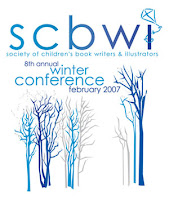
It was a year ago that I packed up my warmest coat/sweater and headed east...to New York City and to my first SCBWI Winter Conference. (Here is my blog post from that conference. )I remember being a bundle of nerves. Not sure if spending a $1000 for the development of my writing career was worth it. The writing intensive on Friday was the reason why I went. It was the first time it was held. 150 writers of picture books, middle grade and young adult fiction met in groups of 8 to read 500 words of their manuscript. Each group was facilitated by either an agent or an editor. It wasn't clearly defined what 500 words to bring...either a synopsis, 1st two pages, or somewhere in the middle. After beginning the sessions, it was clear that only the first 500 words of your story mattered. Selecting something from the middle raised too many questions and then, poof, your fifteen minutes were gone, spent explaining what the hell your story was about.
For my first session, I read my first 2 pages. The writers in my group were kind (and talented) and offered the same high caliber critiques I was used to getting from my writing group. Many liked the premise. Some pointed out strangely worded sentences. The editor didn't have too much to say (she was very sweet and I think somewhat nervous of hurting our feelings). But she did say something that stuck with me. She said in a high-concept novel like mine, I had to be careful that my 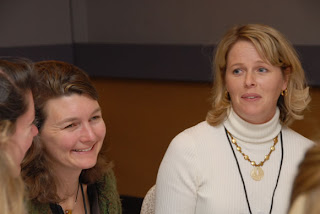 main character didn't get lost.
main character didn't get lost.
I thought about this comment for a long time. I agreed with her right away. I knew it was my weakness. Developing my novel about a small town gymnast navigating her way through a boarding school for aspiring Olympians took many years. Plot, pacing, secondary characters, internal and external motivation, etc, took time. Left: This picture is hysterical! I found it on the SCBWI website...it was taken during my first session. To say I had a slight case of anxiety is an understatement.
But since the conference a year ago, I have focused my energies on learning how to get more of my character into the novel. It hasn't been easy for me. I've struggled a bit with my third person POV choice, but felt very strongly that the novel had to be written this way. It has since developed into close third, which is something I'm still refining. Most of all, I've been looking for ways to layer in brush strokes and character nuances. It's not easy especially since I just finished Book of a Thousand Days and absolutely loved the main character. What a role model! What a girl! I cheered for her from day one. It is very hard to do what Shannon Hale has done...not that I think I should be at her level. I'm so not. But I can try.
I think back to my session with Jennifer Hunt, when she spoke about Twilight, Story of a Girl and Diary of a Part-Time Indian. She certainly has the ability to pick successful books! She invited us to submit, which I never did. I still can. The invitation expires this month. But I'm not sure of my book is a match for her list.
I would love to go back to the New York conference. Maybe next year. The Los Angeles Summer Convention occurs during a time when I'm lounging on my cottage deck in PEI. There is no way, I'm hopping on a plane back to LA then. Not when there's lobsters to eat and golf to be played.
So Greenwood Girls continues to be revised, even as agents consider it. (Yes! I've done it...started the submission process!).
So maybe next year. New York City. Anyone in?
Blog: Read Roger - The Horn Book editor's rants and raves (Login to Add to MyJacketFlap)
JacketFlap tags: Movies, sequels, How to Write a Book, Lloyd Alexander, history overtaken by events, Add a tag
In watching the three Bourne movies in close succession over the past week, Richard and I spotted a neat thing we had missed when viewing them at the theater: the final scene of the second movie, The Bourne Supremacy, is also the climax of the third movie, The Bourne Ultimatum, with a completely different dramatic purpose. I asked Elizabeth if she could think of any books-in-series that worked this way, and she came up with two related but inexact examples: that it wasn't until Lloyd Alexander had submitted The High King to his editor Ann Durrell that she told him he had missed a book and sent him off to write Taran Wanderer; and that Jan Karon was forced after the fact by fans to plug a plot hole in her Mitford series. Any others?
Blog: Not Just for Kids (Login to Add to MyJacketFlap)
JacketFlap tags: fantasy, what I'm reading, Lloyd Alexander, Add a tag

Here's an oldie but a goodie. I reread this for a 5th/6th Grade Book Discussion Group that I am hoping to get off the ground at work. I'll be curious to see what the kids make of it.
I read somewhere (and I'll have to find the citation before Tuesday night!) that The First Two Lives of Lukas-Kasha was a very personal book for Lloyd Alexander. This is not hard to believe. Storytelling plays a crucial part in the book, and Alexander was a master storyteller.
Lukas-Kasha is a layabout young man who is at his best when making mischief. One day, a traveling magician, Battisto the magnificent, rolls into the town where Lukas lives. He sets up shop and calls for a participant who is "bold enough to face every peril, to dare the unknown." Lukas steps up to the challenge and promptly gets his head ducked into a bucket of water. He is transported to another location, where he is dragged out of the sea and promptly declared King Kasha. And that's just the start of his problems. He finds himself caught in a power struggle with his Vizier, caught between two warring nations, and caught between the desire to live the lazy life of a pampered king (a role he is naturally suited for) and the growing realization that he has the wisdom and the quick wits to rule wisely. All while wondering when and if Battisto will ever pull his head out of the water, and take this new life away.
When I read this book as a middle schooler, I felt it was bittersweet. I remember talking with the friend who introduced me to it about that (and we talk about it still!) Reading it now, I have a much different interpretation (not to mention a new theory for just what exactly happens to Lukas-Kasha while his head is submerged in the bucket.) I have since read every book Lloyd Alexander has written, and can neatly place this volume within the cannon. I have the benefit of nearly 20 years between readings. As a pre-teen girl I was totally caught up in the interpersonal relationships between the characters and heartbroken when I saw them come to an end. I could see the point Alexander was making, but I didn't approve! This time around I "get" what Alexander was saying: life is a journey; there is no certainty but uncertainty; stories have the power to heal and protect us. I also noticed the non-stop action in this book, and thought that I really must recommend it to more boys! And I couldn't help thinking how much Nur-Jehan, the bold and spirited Beishangari slave girl (who of course is so much more than she seems--as are all of Alexander's heroines) sounds like a Klingon, with all her talk of honor and warrior codes. I love the way we (that's the royal "we" BTW) cross-pollinate Art with the references and experiences we pick up every day. There is a lot of that in this book, too, as the characters apply knowledge from one sphere of their experience onto another.
Alexander dedicated The First Two Lives of Lukas-Kasha to "all who can imagine it really happened, and for all who wish it could". I now count myself among both camps. They are equally satisfying.
Blog: Cana Rensberger (Login to Add to MyJacketFlap)
JacketFlap tags: scbwi conferences, writerly ramblings, i don't stink, writerly ramblings, scbwi conferences, i don't stink, Add a tag
We're back! The Hoggetowne Scribbles AND Doodlers had a blast! The weekend was fabulous! And, as usual, our regional adviser, Linda Bernfield put together an awesome conference. I came away with so much. My head is full. It may take a while to decompress and process everything.
We started with the Writer's Intensive all day Friday. I can't even begin to list everything I learned. Let's just say that over the years I've found that the more I learn, the more I realize I have to learn to understand the complexity of writing that really great book. The highlight of the day, for me, was when we broke into groups for our 500 word critique. Normally you bring the first 500 words, but since the registration said we could bring an excerpt, some of us did, including me. The interesting thing though, is as others read, and I looked at my "excerpt", I had that "aha" moment. The other writers, including the queen of realistic fiction, Alex Flinn, agreed unanimously. I actually brought the first 500 words. Finally, I've found the beginning of my YA. Wow. Now I have much work to do.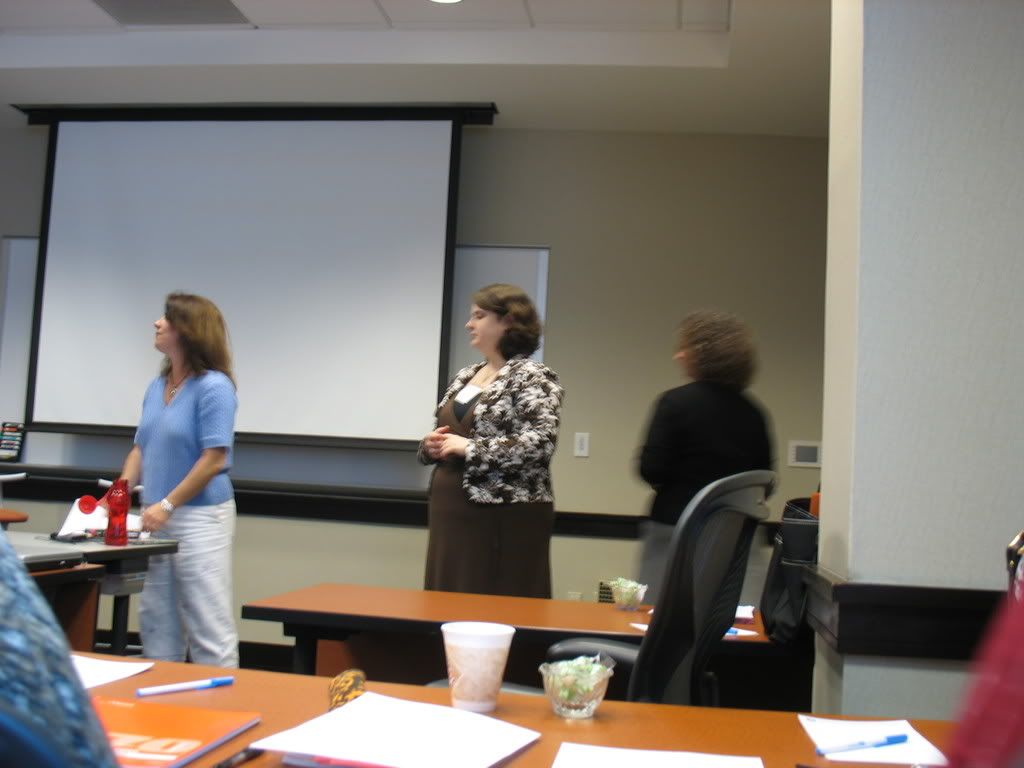
Alex Flinn, Molly O'Neill, Joyce Sweeney
Molly O'Neill was delightful. She's an Assistant Editor at Bowen Press, a new imprint of Harper Collins. She was incredibly approachable and sweet. I found her workshops and critique to be extremely helpful. Character, character, character. Yes, I have more work to do.
Joyce Sweeney shared much of her wisdom, as always. I always learn so much from her. I'm saving my dimes to send her a manuscript or two. She has helped a whopping 21 authors get published. I'd give my right toe to be one of her credits!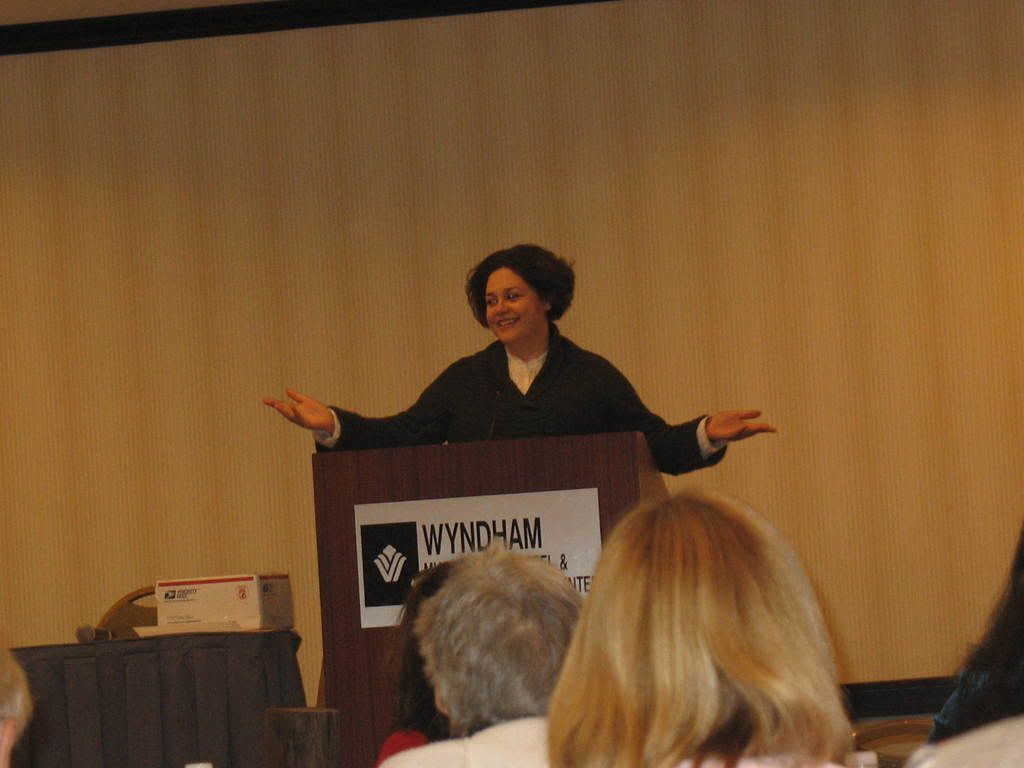
Nadia Cornier of Firebrand Literary
Nadia was funny, funny, funny. I can see why their agency is sought after. Her workshop on promoting yourself was a bit intimidating. Like I said, the more you learn, the more you find out you don't know. (I never did get to see her dove trick though.)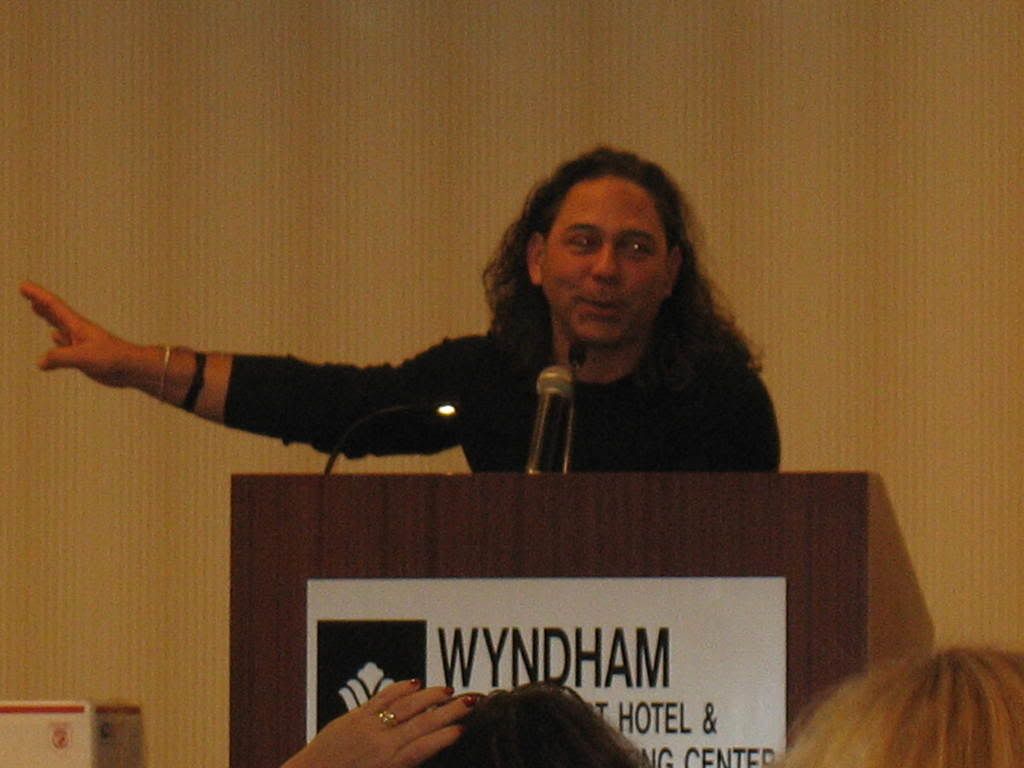
David Diaz, 1995 Caldecott Medal winner
Anyone who's ever met David Diaz understands. He's everywhere. What a sweet guy.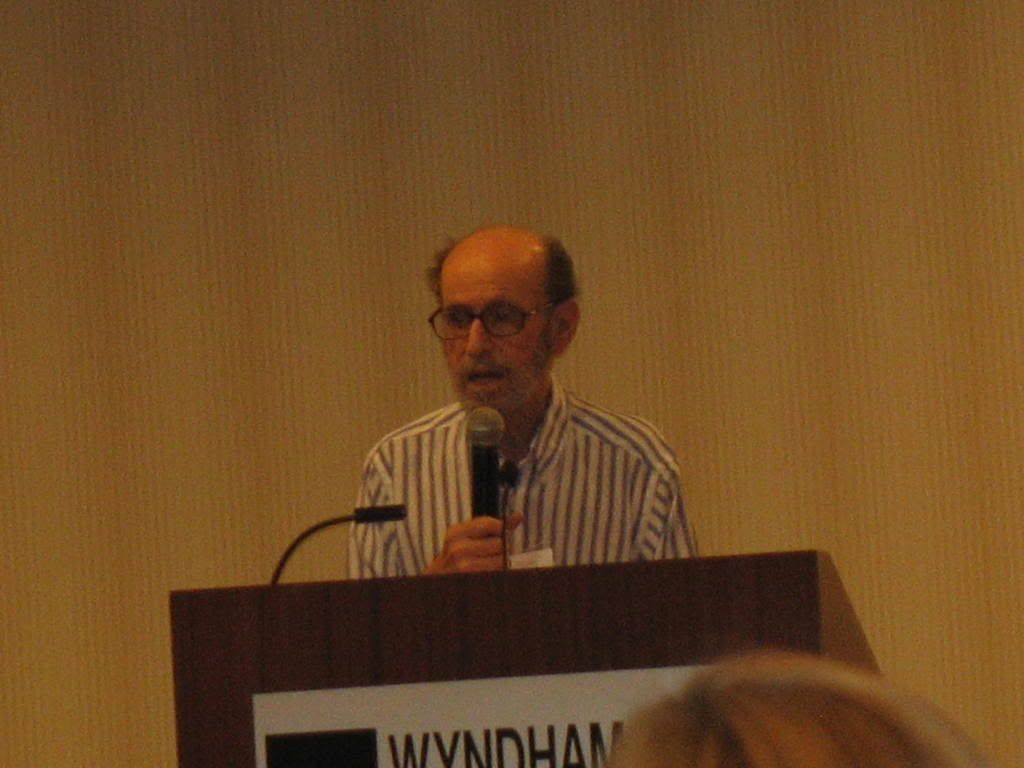
Sid Fleishman, Newbery Medalist
Wow. Sid Fleishman. An amazing man with an equally amazing story. Wow.
There were other speakers. How could I have missed getting a picture of Lee Bennett Hopkins? He was incredibly inspirational and I'm certain my eyes weren't the only teary ones as he read from his war anthology. And no picture of Adrian Fogelin? What was I thinking? Her speech was so fabulous that I found myself sitting on the floor in her workshop the next day, facing several other writers who had to find seating just outside the door in the hallway. She critiqued my YA and saw things in my characters that I'd never considered. Wonderful insight.
The one word to sum up the conference for me is motivation. What motivates my characters? Why do they feel the way they do? Why do they act the way they do? What is the thread the ties them together, these characters that seem so different from one another? I imagine if you talked to other writers, they heard something else. But that's what resonated with me. That's my focus as I begin to revise once again. I'm going to have one of my characters write a letter to the friend that dies in my YA. I need her to show me what she really feels and thinks. Thanks to Molly's suggestion, I'm going to rewrite some scenes from another character's viewpoint in my MG, so I can see how they view my main character. So many great ideas. So much work ahead.
But the one thing I really gained from this conference is the conviction that I can do this. I've come so far. I'm so close...yet so far. But I know I can get there. I will rise above the slush. I just have to keep working at it. I really don't stink. I'm even making a new tag so I can reread this post, and remember the emotions and revelations that I took away with me this year.
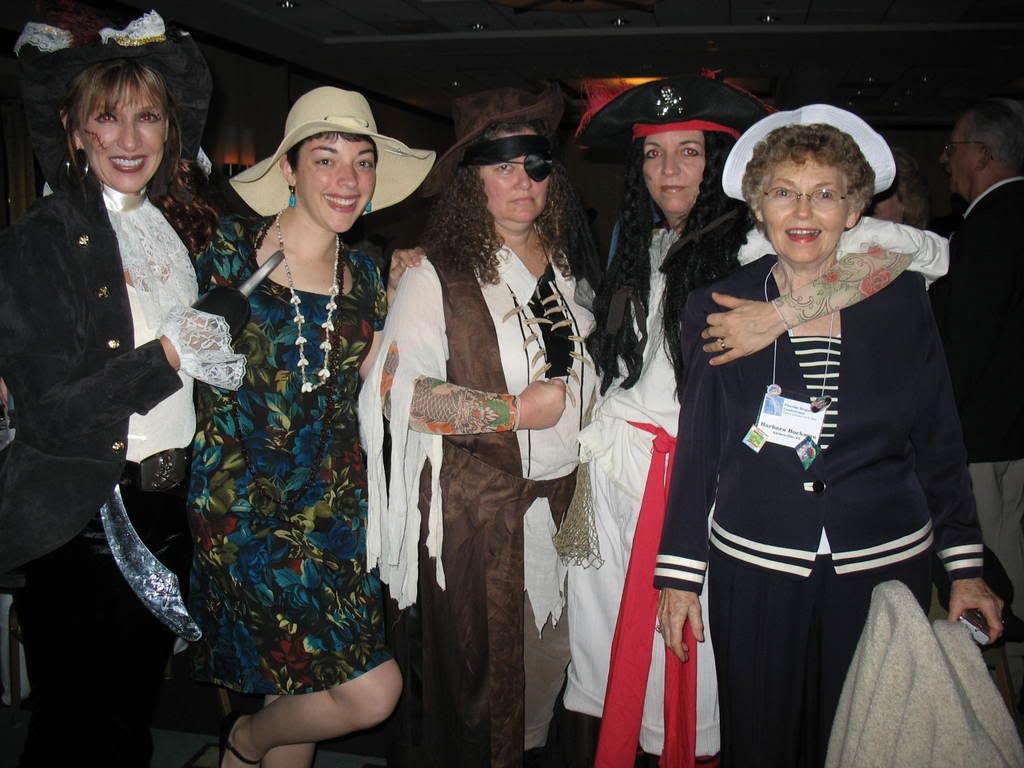
The Hoggetowne Scribbles & Doodlers
Linda Eadie, Anna Horton, Cana Rensberger, Ena Jones, Barbara Bockman
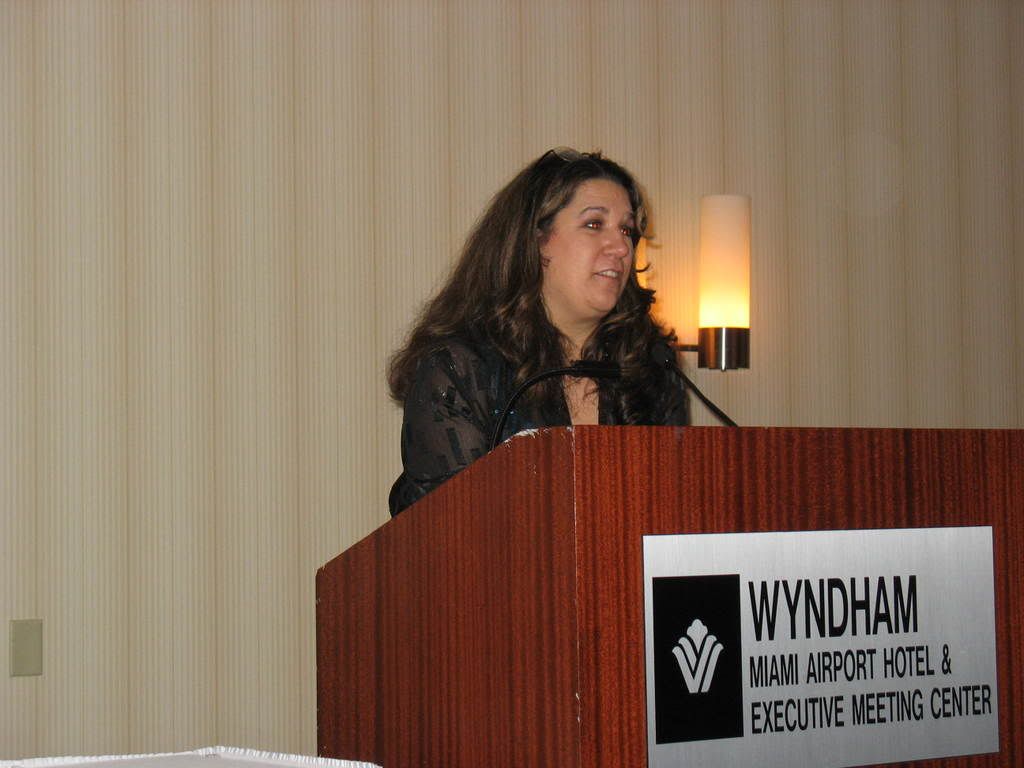
Linda Rodriguez Bernfeld, Fla. SCBWI Regional Adviser
Thank you, Linda, for another absolutely amazing conference!
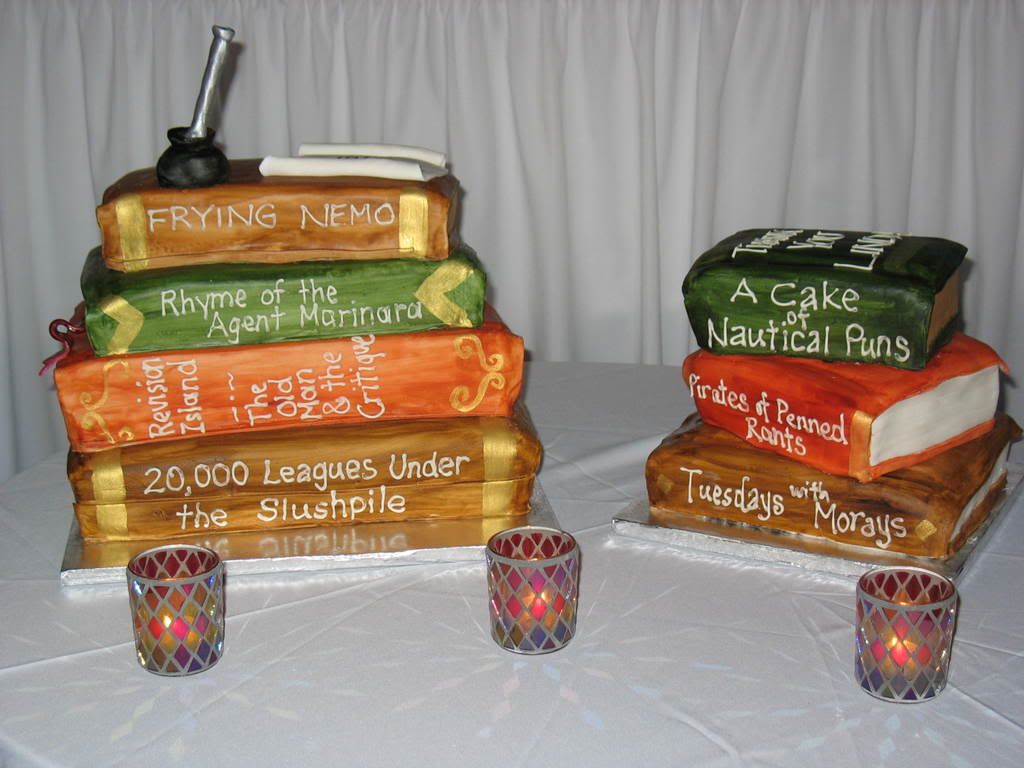
Cakes, made by Gaby Triana
Really. Those are cakes. Amazing, huh? They are in honor of Linda Bernfeld and the Fla. SCBWI's 6th conference.

The Hoggetowne pirates and David Diaz
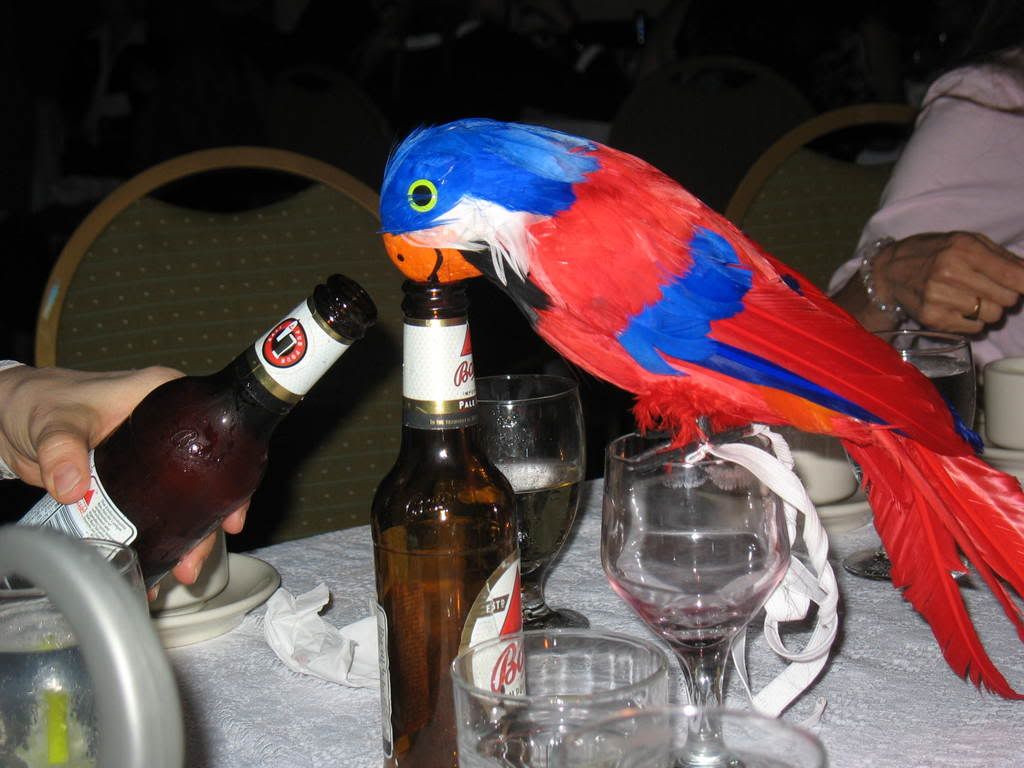
"Crank, you're such a lush!"
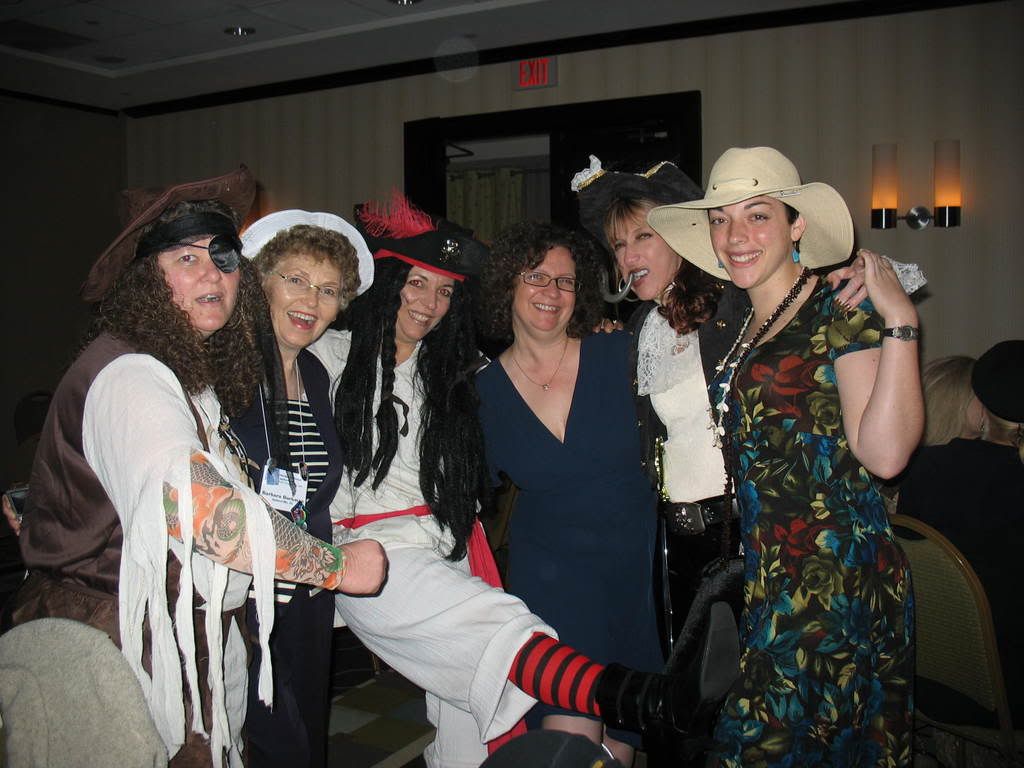
The Hoggetowne Scribbles & Doodlers with Joyce Sweeney
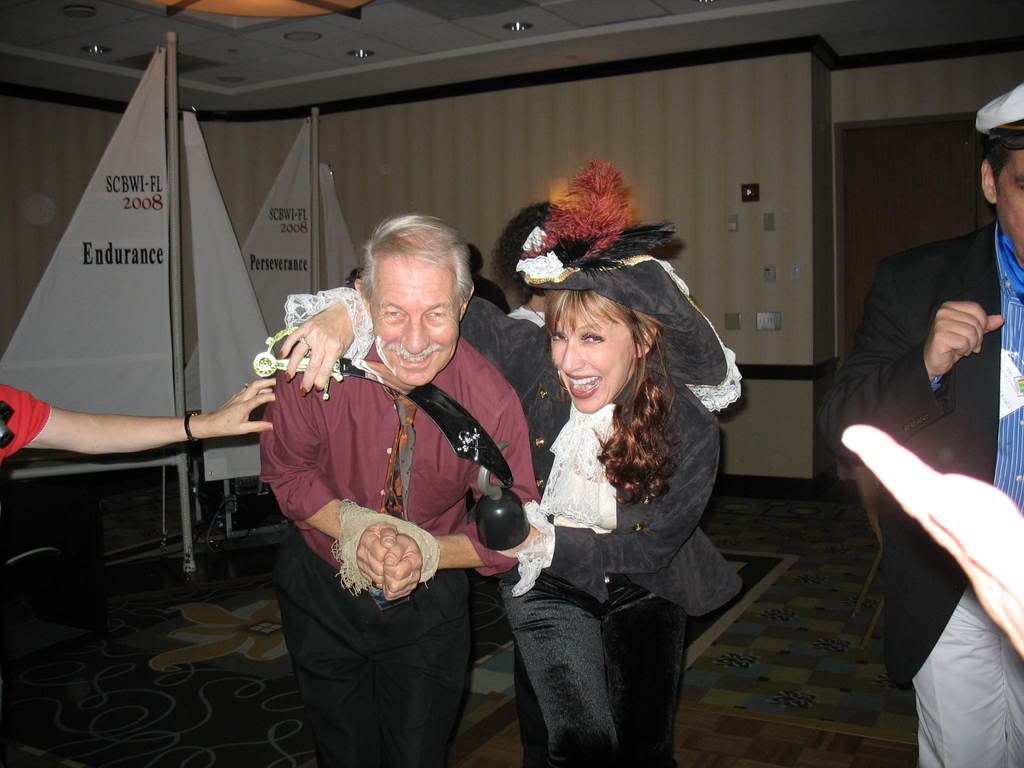
The Captain captures Frank Remkiewicz!
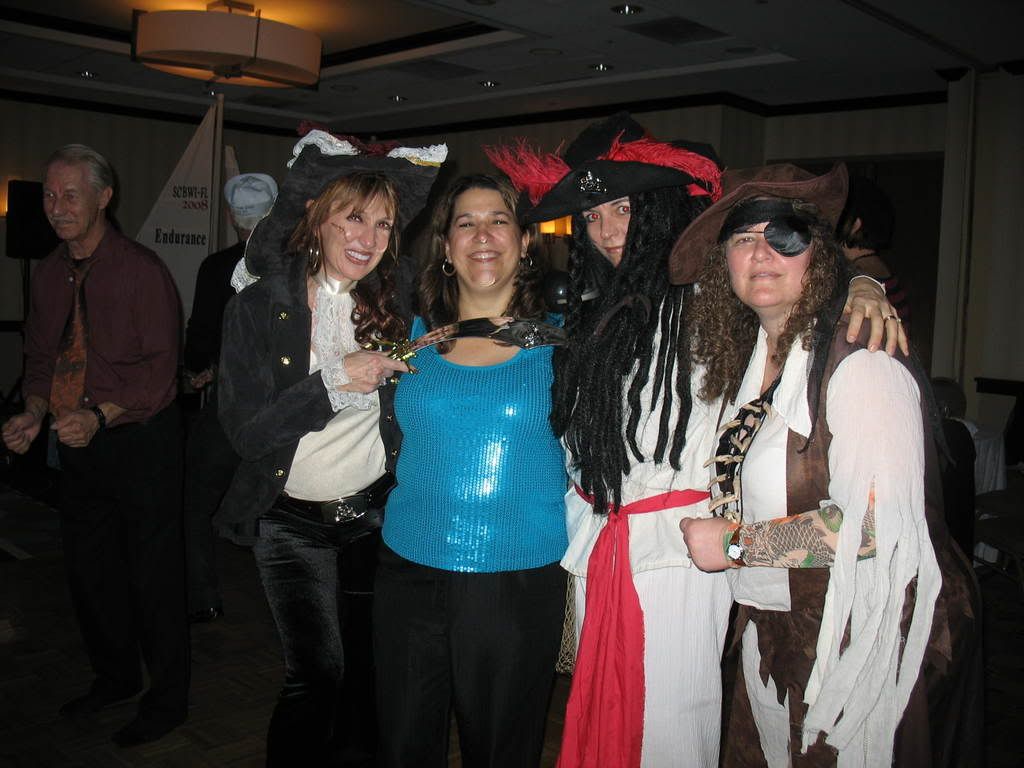
The Hoggetowne Pirates with Linda Rodriguez Bernfeld.
(Captain Hooker, Sea B*tch, and Salty Boob)
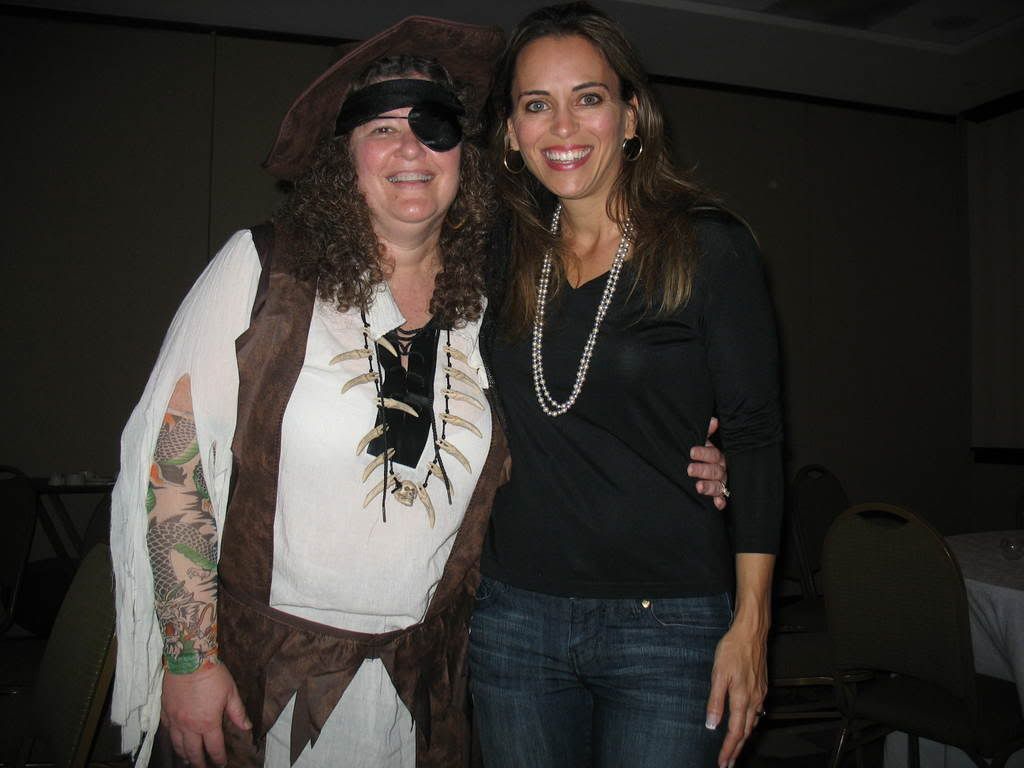
Me and Debbie Reed Fischer
Author of Braless in Wonderland, due out April, 2008 and
Swimming with Sharks, also due out in 2008.
So, the word for the year is MOTIVATION. What's your motivation? What's the motivation for your characters? Here's hoping we all find that motivation and that this will be the year we don't stink!!!! Add a Comment
Blog: Read Roger - The Horn Book editor's rants and raves (Login to Add to MyJacketFlap)
JacketFlap tags: Celebrities, New York City, Horn Book, Lloyd Alexander, Add a tag
and a fine trip it was. Monday evening I had the chance to meet scads of people from the child_lit listserv including its creator Michael Joseph, whose glasses I want but don't think I could pull off (him or on me). The food was just-okay--wild boar shouldn't be as boring as this one was--but the conversation was lively even before Linda Sue Park showed up with a Colin Farrell story I'll let her tell.
The next day I had a commiserative--and tasty--lunch with FSG publisher Margaret Ferguson which was its own delight and came with the bonus of a gift from editor Wes Adams--Alan Bennett's The Uncommon Reader, a novella, Wes assured me, that would provide fine entertainment for my bus trip home. Concerning itself with what might happen should the Queen conceive a passion for reading, it did, hugely. I can already see Helen Mirren doing it as a Hallmark Hall of Fame Christmas Special.
I didn't know Lloyd Alexander but he certainly had enough friends without me, many of whom spoke warmly at the celebration in his honor hosted by Cricket's Blouke and Marianne Carus. Did you know Lloyd was "Old Cricket"? Most unexpectedly hilarious was Lloyd's longtime editor Ann Durell explaining why she agreed to publish, in a fantasy-unfriendly era, what would become the Prydain series: Lloyd's agent had plied her with martinis. My old BCCB colleague Kate Pierson Jennings was there, too--she had been exchanging letters with Lloyd since she was ten years old.
Back here to the sad news that Elizabeth Watson--Horn Book Board member, longtime reviewer and past president of ALSC--had died on October 13th. Liz was great--sometimes the conversations at our old reviewer meetings could get a bit rarefied, and cutting right through it all would come Liz's cultured and authoritative contralto: "no child is going to touch that book."
View Next 8 Posts





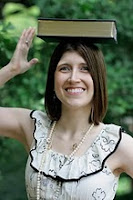

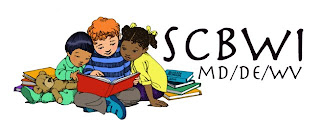
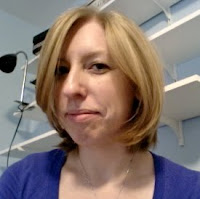




















That's a great line-up! I loved The Sky is Everywhere. SCBWI-MI is having a novel revision retreat this fall, but I can't make it this year.